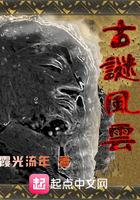But the good Tourainian had his wits about him. Believing that if a cat may look at king, he, a baptised Christian, might certainly look at a pretty woman, he stepped forward, and feigning to grin at the page, he strutted now behind and now before the lady. She said nothing, but looked at the sky, which was putting on its nightcap, the stars, and everything which could give her pleasure. So things went on. At last, arrived outside Portillon, she stood still, and in order to see better, cast her veil back over her shoulder, and in so doing cast upon the youth the glance of a clever woman who looks round to see if there is any danger of being robbed. I may tell you that Jacques de Beaune was a thorough ladies' man, could walk by the side of a princess without disgracing her, had a brave and resolute air which please the ***, and if he was a little browned by the sun from being so much in the open air, his skin would look white enough under the canopy of a bed. The glance, keen as a needle, which the lady threw him, appeared to him more animated than that with which she would have honoured her prayer-book. Upon it he built the hope of a windfall of love, and resolved to push the adventure to the very edge of the petticoat, risking to go still further, not only his lips, which he held of little count, but his two ears and something else besides. He followed into the town the lady, who returned by the Rue des Trois-Pucelles, and led the gallant through a labyrinth of little streets, to the square in which is at the present time situated the Hotel de la Crouzille. There she stopped at the door of a splendid mansion, at which the page knocked. A servant opened it, and the lady went in and closed the door, leaving the Sieur de Beaune open-mouthed, stupefied, and as foolish as Monseigneur St. Denis when he was trying to pick up his head. He raised his nose in the air to see if some token of favour would be thrown to him, and saw nothing except a light which went up the stairs, through the rooms, and rested before a fine window, where probably the lady was also. You can believe that the poor lover remained melancholy and dreaming, and not knowing what to do. The window gave a sudden creak and broke his reverie. Fancying that his lady was about to call him, he looked up again, and but for the friendly shelter of the balcony, which was a helmet to him, he would have received a stream of water and the utensil which contained it, since the handle only remained in the grasp of the person who delivered the deluge. Jacques de Beaune, delighted at this, did not lose the opportunity, but flung himself against the wall, crying "I am killed," with a feeble voice. Then stretching himself upon the fragments of broken china, he lay as if dead, awaiting the issue. The servants rushed out in a state of alarm, fearing their mistress, to whom they had confessed their fault, and picked up the wounded man, who could hardly restrain his laughter at being then carried up the stairs.
"He is cold," said the page.
"He is covered with blood," said the butler, who while feeling his pulse had wetted his hand.
"If he revives," said the guilty one, "I will pay for a mass to St.
Gatien."
"Madame takes after her late father, and if she does not have thee hanged, the least mitigation of thy penalty will be that thou wilt be kicked out of her house and service," said another. "Certes, he's dead enough, he is so heavy."
"Ah! I am in the house of a very great lady," thought Jacques.
"Alas! is he really dead?" demanded the author of the calamity. While with great labour the Tourainian was being carried up the stairs, his doublet caught on a projection, and the dead man cried, "Ah, my doublet!"
"He groans," said the culprit, with a sigh of relief. The Regent's servants (for this was the house of the Regent, the daughter of King Louis XI. of virtuous memory) brought Jacques de Beaune into a room, and laid him stiff and stark upon a table, not thinking for a moment that he could be saved.
"Run and fetch a surgeon," cried Madame de Beaujeu. "Run here, run there!"
The servants were down the stairs in a trice. The good lady Regent dispatched her attendants for ointment, for linen to bind the wounds, for goulard-water, for so many things, that she remained alone. Gazing upon this splendid and senseless man, she cried aloud, admiring his presence and his features, handsome even in death. "Ah! God wishes to punish me. Just for one little time in my life has there been born in me, and taken possession of me, a naughty idea, and my patron saint is angry, and deprives me of the sweetest gentleman I have ever seen. By the rood, and by the soul of my father, I will hang every man who has had a hand in this!"
"Madame," cried Jacques de Beaune, springing from the table, and falling at the feet of the Regent, "I will live to serve you, and am so little bruised that that I promise you this night as many joys as there are months in the year, in imitation of the Sieur Hercules, a pagan baron. For the last twenty days," he went on (thinking that matters would be smoothed by a little lying), "I have met you again and again. I fell madly in love with you, yet dared not, by reason of my great respect for your person, make an advance. You can imagine how intoxicated I must have been with your royal beauties, to have invented the trick to which I owe the happiness of being at your feet."















